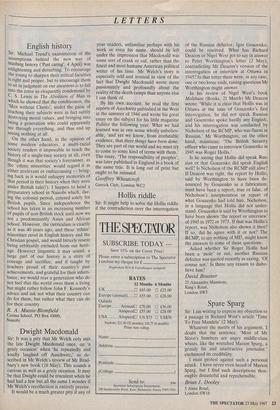Dwight Macdonald
Sir: It was a pity that Mr Welch only met the late Dwight Macdonald once, on 'a grisly occasion' when 'he repeatedly and loudly laughed off Auschwitz,' as de- scribed in Mr Welch's review of Mr Brad- bury's new book (16 May). This sounds a curious as well as a grisly occasion. It may be that Dwight could be truculent when he had had a few but all the same I wonder if Mr Welch's recollection is entirely precise.
It would be a much greater pity if any of your readers, unfamiliar perhaps with his work or even his name, should be left under the impression that Macdonald was some sort of crank or oaf, rather than the finest and most humane American political writer of his time. Mr Welch's story is especially odd and ironical in view of the fact that Dwight Macdonald wrote more passionately and profoundly about the reality of the death camps than anyone else I can think of.
By his own account, he read the first reports of Auschwitz published in the West in the summer of 1944 and wrote his great essay on the subject for his little magazine Politics the following year. What we had learned was in one sense wholly unbeliev- able, 'and yet we know, from irrefutable evidence, that these things have been done. They are part of our world and we must try to come to some kind of terms with them.' The essay, 'The responsibility of peoples', was later published in England in a book of the same. title. It is long out of print but ought to be reissued.
Geoffrey Wheatcroft
Garrick Club, London WC2









































































 Previous page
Previous page